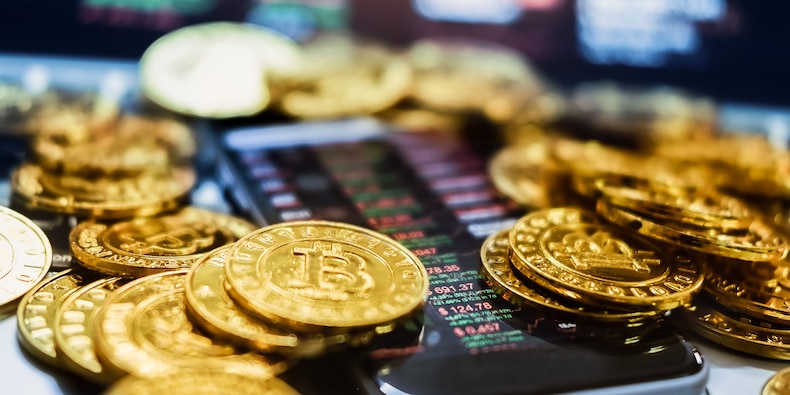Bitcoin slumped Wednesday and into Thursday.Jirapong Manustrong/Getty Images
13 years after its creation, bitcoin remains a debated asset class that is often compared to gold.Bitcoin is not seen as a store of value by all investors given its volatility and short history.Here’s how bitcoin compares to gold as a store of value based on 8 key factors, according to JPMorgan.Sign up here for our daily newsletter, 10 Things Before the Opening Bell.The underlying value of the bitcoin network isn’t determined by cash flows or dividends, metrics commonly used to value stocks. Instead, the price of bitcoin is solely determined by supply and demand dynamics driven by its buyers and sellers.
“Nothing inherently valuable underpins the bitcoin network, similar to many of the world’s fiat currencies since leaving the gold standard,” JPMorgan explained in a Friday note.
But the bank does see bitcoin’s technology driving value in its network, mainly its digital scarcity. There will only be 21 million bitcoins in existence once the last one is mined 118 years from now. That digital scarcity sparked a surge in its price since the start of the pandemic as governments around the world significantly increased their debts and money supply.
That dynamic has led some investors to look for alternatives to fiat currencies as a store of value, like bitcoin and gold.
“While many are buying cryptocurrencies (chasing in our opinion) because the cryptocurrencies are appreciating and/or are meaningfully outperforming other asset classes, we think the merits of bitcoin will endure near-term fluctuations in value, both in terms of digital scarcity as well as a good store of value,” JPMorgan said.
These are the eight characteristics that help define what a store of value is, and how bitcoin compares to physical gold in each category, according to JPMorgan.
1. Durable
“Bitcoin cannot be destroyed nor does it perish. It will survive as long as the network survives, which given the network is decentralized makes bitcoin very hard to destroy. When comparing gold to bitcoin, both are durable,” JPMorgan said.
2. Portable
“Bitcoin is particularly easy to store and transport. Large quantities of Bitcoin can be transmitted all over the world nearly instantly and can be stored on a cell phone. Gold is far harder and more expensive to store, transport and insure,” JPMorgan said.
3. Fungible
“Bitcoin is fungible and is interchangeable with all other Bitcoin. Gold is generally fungible and can be readily seen as better than diamonds, which can have different qualities and shapes that impact value. That said, gold comes in different measures of purity with 24k gold and 14k gold of different values. The edge goes to Bitcoin,” JPMorgan said.
4. Divisible
“Bitcoin is divisible out to eight decimal places, out to 1/100,000,000, which today is worth $0.0005. Gold is divisible, but not easily accurately,” JPMorgan said.
5. Scarce
“Bitcoin has a finite number of tokens, capped at 21mn, which will be mined by ~2140. Gold is difficult to mine and there is expected to be a finite amount. However, as the price of gold rises, so does the supply,” JPMorgan said.
6. Verifiable
“Bitcoin is readily verifiable with transactions recorded on the blockchain, which is publicly available for all to view. Gold too is verifiable, but can also be forged and its purity can be diluted, making value more questionable,” JPMorgan said.
7. Free from censorship
“No entity (including developers or miners) has any undue influence on a users’ Bitcoin. As such, Bitcoin is censorship resistant and because the protocol is decentralized, it is not subject to the demand or constraints of large corporations or governments. Governments do and have restricted both the ownership of gold and the transfer of gold throughout history,” JPMorgan said.
8. History
“Bitcoin has a limited history as a store of value, having only been created in 2009. Gold has been used as a store of value for at least 5,000 years and more likely at least 7,000 years as that is when the first know gold mine was active,” JPMorgan said.
